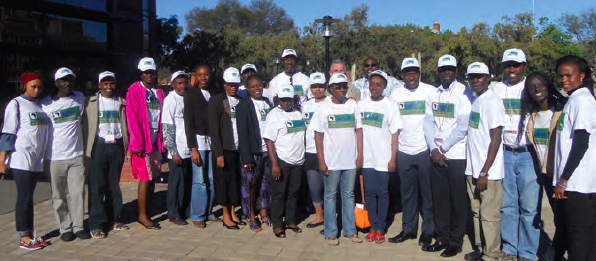Capacity Building through the lens of the African Graduate Nutrition Students’ Network
 Joseph Ashong
Joseph Ashong
Joseph is the Coordinator for the African Graduate Nutrition Students Network. He is a Nutrition Specialist with USAID Ghana.
In recent years, nutrition has gained global recognition as a key development strategy for many governments, bilateral, multilateral and development organisations. Africa is lagging behind in development terms due to many reasons, one of which is poor nutrition. In 2013, over one third of all stunted and wasted children were in Africa. Africa has experienced the smallest relative decrease in underweight (weight for age) prevalence compared to other continents, with an underweight prevalence of 17 per cent in 2013, down from 23 per cent in 1990 (Global Nutrition Report, 2014). More effort is needed across the continent to address undernutrition. Efforts of governments, academic and research institutions, schools and colleges, civil societies, donors, and the media must be stepped up and be better coordinated to achieve real progress toward food and nutrition security in Africa. The African Graduate Students’ Network (AGSNet) aims to support the process.
The AGSNet was initiated in 2002 by a group of students at Cornell University, USA, as a platform for networking and relationship building among nutrition students and young African nutrition professionals. The AGSNet aims to build core nutrition competencies, organizational skills as well as appropriate attitudes and values while fostering the development of strong African nutrition advocates or champions who will keep the fight against malnutrition in Africa at the forefront of their work.
Activities
The network currently holds a congress twice per year as part of the African Nutritional Epidemiology Conference (ANEC) organized by the African Nutrition Society (ANS). At this congress, experts are invited to speak on topics relevant to African nutrition. Additionally, the network hosts training workshops on various topics such as research dissemination.
Community activities are also arranged for members to foster a common attitude. Recently the network conducted an outreach visit to the Tower of Hope, a non-governmental organization based in Bloemfontein, South Africa. Tower of Hope supports and advocates for the rights of people living on the street. AGSNet members gave a talk and answered questions on basic health and nutrition.
Membership and operations
AGSNet currently has over 400 members from over 40 countries in Africa, Europe, North America and Asia. Members pay an annual membership of approximately $25 USD (though this is country specific). The network is run by an elected, voluntary steering committee and is supported by regional and country representatives who are encouraged to organize activities at the country level and to promote AGSNet. For instance, members in Nigeria recently held a meeting where they brought in experts to talk about career development and how to achieve higher nutrition qualifications.
The network’s main medium of communication is email. It has a list-serve by which information is shared and members interact. The network has a website and a Facebook account. Information on workshops, seminars, conferences, jobs, latest nutrition research, relevant articles, and general good practices are shared on these platforms as well as via the listserve.
AGSNet members are encouraged by the network to attend conferences, training workshops and seminars to enhance their technical capacities and network with experts in the field to build social capital. The network sources external funding for specific activities.
Challenges
Membership. AGSNet membership is mostly made up of students. Keeping up the interest and enthusiasm of members after their training as well as encouraging new students/members to join has always been a challenge.
Payments and financing. Membership is paid in-country, AGSNet does not have a system for global fee collection. Additionally, while the secretariat works on a voluntary basis, funding is required for specific projects.
These challenges notwithstanding, the network has been able to hold meetings in Morocco, Kenya and South Africa since its inauguration in 2005. It has also been successful in creating a platform for collaboration and sharing of ideas between young Africans in an atmosphere of openness, sincerity and friendship.
Moving forward
The network is very active and has several projects running currently. Specifically, the network is
- Developing a mentorship programme in which members will be matched with experienced nutritionists, particularly those working in Africa
- Exploring the possibility of collaborating with other national and international nutrition societies and similar goal-oriented organisations
- Revamping its website to include a list of African nutritionists, their locations and areas of expertise to make it easier for the global community to find collaborators for work in and/or related to nutrition in Africa
- Developing an advocacy and communications strategy to support nutritionists in advocating for nutrition
- Building relationships with institutions such as African Union Commission to contribute to the discussion around nutrition in Africa
There is a growing community of young and enthusiastic Africans championing the fight against malnutrition in Africa. AGSNet is building friendship and a unifying front among them for improved nutrition in Africa.

